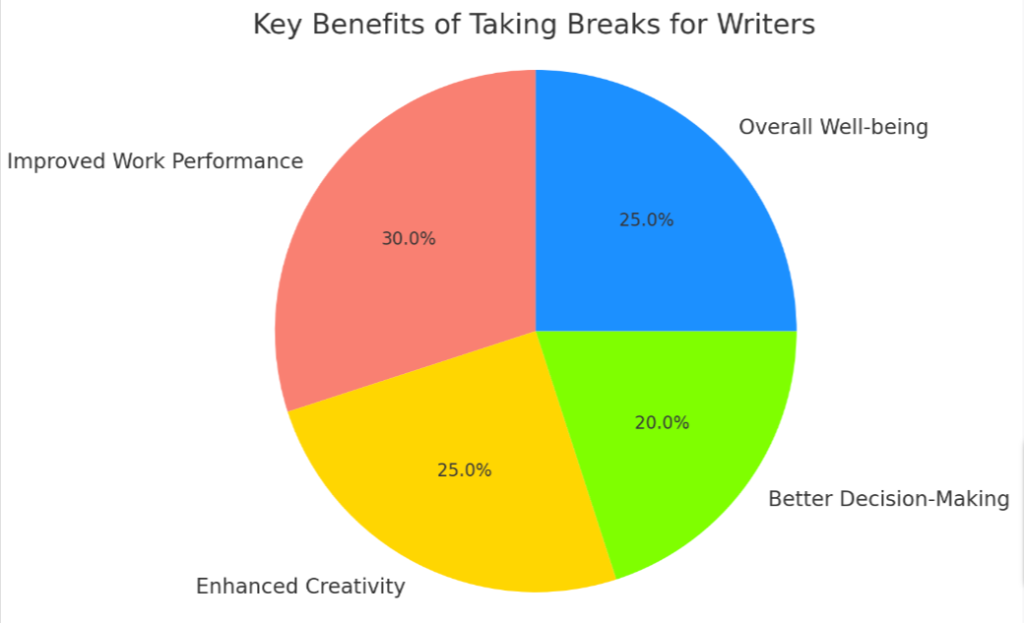Pause to Progress: Why Breaks Boost Your Writing Quality
Are you constantly feeling burned out with a never-ending to-do list? Studies show that taking regular breaks can significantly improve productivity and creativity. This article will guide you on how to effectively incorporate and maximize these needed pauses into your routine.
Keep reading – it’s time to recharge, refocus, and write better!
Key Takeaways
- Regular breaks improve work performance by reducing stress and preventing burnout.
- Taking breaks enhances creativity by allowing the mind to explore new ideas and perspectives.
- Breaks empower better decision making by providing mental clarity and improving focus.
- Incorporating breaks into your routine increases overall productivity, motivation, and well – being.
The Benefits of Taking Breaks
Taking breaks offers a range of valuable benefits including improved work performance, enhanced creativity, better decision making, and increased focus.
Improved work performance
Regular breaks throughout the day can lead to significant improvements in work performance. Our minds need occasional pauses to unwind and recharge, which helps us maintain a high level of focus and energy at work.
By disconnecting from tasks momentarily, we can reduce stress and fatigue that often result from continuous work without rest. This rejuvenation not only improves concentration but also prevents burnout.
Therefore, employees who imbibe restful breaks into their daily routine typically observe an enhancement in productivity; they find themselves more motivated and energized for challenging projects ahead.
Not only does improved performance positively impact our professional growth, but it also fosters better mental wellbeing overall.
Enhanced creativity
Periodic breaks ignite the creative spark within us. Immersing yourself in a different environment or activity can stimulate new ideas, leading to innovative thinking. Stepping away from a task allows the subconscious mind to unravel complex problems while you unwind and relax.
Boosting creativity also requires rest and recovery periods during work hours. Unplugging from technology lets our brains explore diverse perspectives, triggering unique solutions that might not surface under constant pressure.
Hence, rejuvenating your mind through breaks enhances creativity significantly. Such practices help revitalize one’s imagination, proving beneficial for various jobs requiring original thought process and improvisation.
Better decision making
Taking regular breaks empowers you to make improved decisions. Just as your body needs a moment of rest after strenuous physical activity, your mind requires downtime to recharge and regain focus.
A well-rested brain sifts through information more efficiently, allowing you to evaluate options and foresee consequences with heightened clarity. This mental clarity can prove invaluable in decision-making processes, particularly when solving complex problems or formulating strategies at work.
It also helps boost concentration, enabling you to process data faster while reducing the chances of errors that could stem from stress-induced hastiness. So step away from the desk for a bit – calm those racing thoughts, clear your minds and watch as better decisions start flowing naturally!

Increased focus
Taking regular breaks can significantly increase your focus. When you’re constantly working without a break, your mind becomes fatigued and less able to concentrate. However, when you take short breaks throughout the day, you give your brain a chance to rest and recharge.
This helps prevent burnout and allows you to maintain high levels of focus and concentration on your tasks. By incorporating breaks into your routine, you’ll be able to stay engaged and attentive, resulting in improved performance and productivity.
Implementing Breaks in Your Routine
Knowing when to take breaks can greatly benefit your productivity and well-being. Be sure to choose the right type of break and set boundaries to avoid feeling guilty. Find out more about implementing breaks in your routine by reading the full article!
Knowing when to take breaks
Take breaks strategically and reap the benefits. Here’s how to know when it’s time to unwind:
- Listen to your body and mind.
- Pay attention to signs of fatigue or decreased concentration.
- Take breaks before you feel overwhelmed or burnt out.
- Prioritize self – care and make breaks a regular part of your routine.
- Consider scheduling shorter, frequent breaks throughout the day instead of longer breaks less frequently.
Choosing the right type of break
Choosing the right type of break can make a big difference in how effectively you recharge and rejuvenate. Here are some options to consider:
- Short breaks: Taking short breaks throughout the day can help prevent burnout and improve focus. Stand up, stretch, or take a quick walk around your workspace.
- Mental breaks: Engaging in activities that switch your focus away from work can provide a mental break. Listen to music, read a book, or do a puzzle to give your mind a rest.
- Social breaks: Connecting with others during your break can boost mood and overall well-being. Have a chat with a colleague, call a friend, or join an online social group.
- Active breaks: Physical activity can release endorphins and increase energy levels. Go for a jog, do some yoga stretches, or take part in a workout class during your break.
- Nature breaks: Spending time outdoors can have restorative effects on your mind and body. Take a walk in nature, sit in the park, or simply enjoy the fresh air during your break.
Setting boundaries and avoiding guilt
Setting boundaries and avoiding guilt are crucial when it comes to taking breaks. By clearly defining the time and duration of your breaks, you can ensure that you’re giving yourself enough time to unwind and recharge.
It’s important to communicate these boundaries with your colleagues or clients so that they understand when you will be unavailable. This will help minimize interruptions and allow you to fully disconnect from work during your break.
Additionally, it’s essential to avoid feeling guilty for taking breaks. Remember that breaks are not a waste of time but rather an investment in your productivity and well-being. By setting boundaries and letting go of guilt, you can fully enjoy your breaks and come back refreshed, motivated, and ready to write better.
Tips for Making the Most of Breaks
Disconnect from work and technology, engage in relaxing activities, and realign with your goals during breaks.
Disconnecting from work
Disconnecting from work is essential for recharging and maintaining a healthy work-life balance. When we constantly stay connected to our work, whether it’s checking emails or thinking about unfinished tasks, it can lead to burnout and decreased productivity.
By consciously disconnecting from work during breaks, we allow ourselves time to rest and rejuvenate our minds. This break allows us to clear our thoughts, reduce stress and fatigue, and ultimately improve our concentration when we return to work.
So unplug from technology, step away from your workspace, and give yourself the opportunity to unwind and recharge.
Engaging in relaxing activities
Engage in activities that help you relax and recharge, such as:
- Taking a walk in nature
- Listening to music or podcasts
- Practicing yoga or meditation
- Reading a book or magazine
- Trying out a new hobby or craft
- Spending time with loved ones
- Watching a movie or TV show
- Taking a nap or getting a good night’s sleep
Realigning with goals during breaks
Use your breaks as an opportunity to realign with your goals. Whether you’re taking a short break or a longer vacation, it’s important to use this time wisely and purposefully. Reflect on what you want to achieve in both your personal and professional life, and how you can make progress towards those goals.
Consider setting small tasks or objectives for yourself during your break that will help you stay motivated and focused when you return to work. By using your breaks as a chance to realign with your goals, you can come back feeling refreshed, reenergized, and ready to tackle any challenges that come your way.
Reaping the Benefits of Taking Breaks
Taking regular breaks not only improves work-life balance, but also increases motivation and productivity, leading to better overall well-being.
Improved work-life balance
Improved work-life balance is one of the key benefits of taking regular breaks. By intentionally stepping away from work and taking time to recharge, you can create a better equilibrium between your professional and personal life.
This allows you to prioritize self-care, spend quality time with loved ones, pursue hobbies and interests, and simply enjoy moments of relaxation. When you have a healthier work-life balance, you’ll feel less overwhelmed and stressed, leading to improved overall well-being and increased satisfaction in both your career and personal life.
Increased motivation and productivity
Taking regular breaks throughout your workday can have a significant impact on your motivation and productivity levels. By allowing yourself time to recharge, you give your mind a chance to rest and rejuvenate.
This break from constant work helps prevent burnout and increases your overall energy and focus when you return to the task at hand. With renewed motivation, you’ll find yourself accomplishing tasks more efficiently, staying engaged for longer periods of time, and producing higher quality work.
Better overall well-being
Taking regular breaks throughout your day can significantly contribute to better overall well-being. When you allow yourself time to unwind and recharge, you give your mind and body a chance to disconnect from work and technology, allowing for much-needed rest and relaxation.
This helps reduce stress and fatigue, improve concentration, prevent burnout, and enhance productivity. By incorporating breaks into your routine, you’ll find that you’re more motivated, energized, and have a renewed sense of focus.
Ultimately, taking breaks not only improves your work performance but also contributes to a healthier work-life balance and boosts your mental wellbeing.
Conclusion
Taking breaks is not just a luxury, it’s essential for our overall well-being and productivity. By allowing ourselves to unwind and recharge, we can clear our minds, improve focus, reduce stress and fatigue, and ultimately write better.
So don’t forget to prioritize rest and relaxation in your routine – your mind will thank you!

